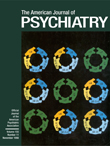Sertraline in the Treatment of Clozapine-Induced Obsessive-Compulsive Behavior
Mr. A, a 39-year-old white man with a 20-year history of paranoid schizophrenia, was treated with multiple traditional antipsychotic medications. He had begun a regimen of clozapine for treatment-refractory psychosis 8 years previously; he showed significant clinical improvement on a dose of 900 mg/day. After 2 years of treatment with clozapine, Mr. A developed severe obsessive-compulsive behaviors including meticulous checking and hand washing to the point of skin excoriation. For nearly 1 year subsequently, Mr. A refused to take clozapine and was treated with risperidone. During this time, his obsession with germ contamination gradually diminished but did not disappear. He was treated with clomipramine, 75 mg/day, with further reduction of obsessive-compulsive symptoms (2). Unfortunately, on this regimen, compared with his previous treatment with clozapine, Mr. A’s psychotic symptoms did not improve. At Mr. A’s request, risperidone and clomipramine were discontinued, and clozapine treatment was restarted. His psychotic symptoms improved significantly, but fluvoxamine was substituted to avoid both the return of compulsive behaviors and the potential anticholinergic side effects of clomipramine. Mr. A’s obsessive-compulsive behavior did indeed improve with fluvoxamine at a dose of 150 mg/day; however, his clozapine blood level began to rise above 700 ng/ml. His clozapine dose was decreased to 600 mg/day (blood level=2295 ng/ml). Clozapine was further decreased to 325 mg/day (blood level=906 ng/ml) and fluvoxamine to 50 mg/day. Although the clozapine blood level remained high, Mr. A responded poorly to these medication changes by becoming more psychotic and agitated. It appears that the addition of fluvoxamine interfered with the efficacy of clozapine, even though the plasma level was higher. This demonstrates that there was not an absolute correlation among clozapine plasma level, dose, and therapeutic response. Fluvoxamine was discontinued, and sertraline, 100 mg b.i.d., was substituted. Subsequently clozapine was raised to 475 mg/day (blood level=307 ng/ml), and Mr. A’s psychotic and obsessive-compulsive symptoms were well controlled.
References
Information & Authors
Information
Published In
History
Authors
Metrics & Citations
Metrics
Citations
Export Citations
If you have the appropriate software installed, you can download article citation data to the citation manager of your choice. Simply select your manager software from the list below and click Download.
For more information or tips please see 'Downloading to a citation manager' in the Help menu.
View Options
View options
PDF/EPUB
View PDF/EPUBGet Access
Login options
Already a subscriber? Access your subscription through your login credentials or your institution for full access to this article.
Personal login Institutional Login Open Athens loginNot a subscriber?
PsychiatryOnline subscription options offer access to the DSM-5-TR® library, books, journals, CME, and patient resources. This all-in-one virtual library provides psychiatrists and mental health professionals with key resources for diagnosis, treatment, research, and professional development.
Need more help? PsychiatryOnline Customer Service may be reached by emailing [email protected] or by calling 800-368-5777 (in the U.S.) or 703-907-7322 (outside the U.S.).

